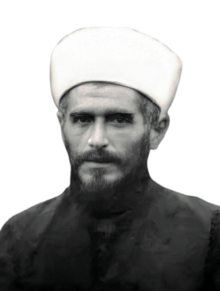| Grand MuftiVehbi Dibra | |
|---|---|
 | |
| Personal life | |
| Born | (1867-03-12)12 March 1867 Dibra, Ottoman Empire (modern-day Debar, North Macedonia) |
| Died | 24 March 1937(1937-03-24) (aged 70) Tirana, Albania |
| Nationality | Albanian |
| Children | Ahmet, Hatixhe, Muhamet, Mereme, Asije and Edip Agolli |
| Parent | Ahmet (Effendi) Agolli |
| Signature | |
| Religious life | |
| Religion | Islam |
| Denomination | Sunni |
| Jurisprudence | Hanafi |
| Creed | Maturidi |
| Muslim leader | |
| Post | Head of the Muslim Community of Albania |
| Period in office | 1923–1929 |
| Successor | Behexhet Shapati |

Abdyl Aziz Vehbi Dibra Agolli (12 March 1867 – 24 March 1937) was an Albanian Islamic scholar and politician. He served as the first grand mufti of the Muslim Community of Albania.
He was a delegate of Dibër at the Albanian Declaration of Independence. He was elected as chairman of the Elderly Assembly, the precursor to what is today the Parliament of Albania and the first Grand Mufti of the Muslim Community of Albania from 1920 to 1929. Vehbi Dibra will also be remembered as the main organizer of the Congress of Dibra.
Life
Vehbi Agolli was born in the city of Dibra on 12 March 1867 to Ahmet Effendi Agolli, mufti of Upper Debre. He studied Islamic theology, law and philosophy and was appointed mufti of Dibër. In 1909, he was elected chairman of the Congress of Dibër, a precursor assembly of the Albanian Revolt of 1910. In November 1912, he participated as a delegate of Dibër in the Assembly of Vlorë, in which the independence of Albania was declared and a national congress was formed. The deputies of the national congress also elected eighteen delegates of the assembly to form the Albanian Senate, of which Vehbi Dibra was the first chairman.
In order to favourably influence the part of the Sunni community that based its view towards the declaration of independence of Albania on the clergy, he presented a fatwā and saluted the declaration as God's gift. A member of the reformist faction of the Sunni community of Albania, in 1920 he was elected to head it as Grand Mufti. During his tenure which lasted until 1929, the waqf properties were documented and registered, the administration was centralized and the religious services reached normalization. Dibra also began the publication of the weekly journal Zani i Naltë and introduced the use of Albanian in religious ceremonies.
References
- "History of Albanian People" Albanian Academy of Science.ISBN 99927-1-623-1
- Skendi, Stavro (1967). The Albanian national awakening. Princeton: Princeton University Press. p. 379. ISBN 9781400847761.
- ^ Schmidt-Neke, Michael (1987). Enstehung und Ausbau der Königsdiktatur in Albanien, 1912-1939 (in German). Oldenbourg Verlag. pp. 320–1. ISBN 9783486543216. Retrieved 14 October 2012.
- Nexhipi, Reshat (1996). Shtypja dhe rezistenca shqiptare në Maqedoni nëpër shekuj: tema të nxjerra nga bibliografia dhe biografia personale. p. 415. Retrieved 14 October 2012.
- Pettifer, James; Nazarko, Mentor (2007-09-15). Strengthening Religious Tolerance for a Secure Civil Society in Albania and the Southern Balkans. IOS Press. p. 57. ISBN 9781586037796. Retrieved 14 October 2012.
- Kressing, Frank; Kaser, Karl (2002). Albania--a country in transition: aspects of changing identities in a South-East European country. Nomos. p. 47. ISBN 9783789076701. Retrieved 14 October 2012.
- Zekaj, Ramiz (2002). The development of Islamic culture among Albanians during the 20th century. Albanian Institute of Islamic Thought and Civilisation. Retrieved 14 October 2012.
- Çaushi, Ahmet. "Haxhi Vehbi Dibra dhe vizioni i tij për Shqipërinë". Rruga e Arbërit (in Albanian). Retrieved 14 October 2012.
- 19th-century Albanian politicians
- 20th-century Albanian politicians
- Grand Muftis of Albania
- Signatories of the Albanian Declaration of Independence
- 1867 births
- 1937 deaths
- Albanian publishers (people)
- People from Debar
- People from Scutari vilayet
- People from Manastir vilayet
- All-Albanian Congress delegates
- Congress of Dibër delegates